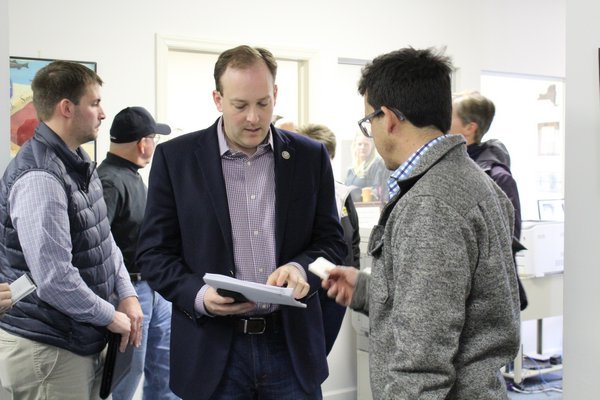

As growers, aquaculture specialists and agriculture business advocates convened to meet with U.S. Representative Lee Zeldin at the Long Island Farm Bureau in Calverton on Saturday morning, one issue was top of mind: the labor shortage on Long Island.
Opening up the roundtable discussion, Long Island Farm Bureau President Karl Novak asked how Congress would help farmers with immigration reform and make legal labor more accessible. Mr. Novak pointed out that historically the agricultural industry has been a bastion of immigrants, from the Polish farmhands of the early 1900s to the industry’s largely Latino workforce now.
Mr. Zeldin expressed support for making it easier for farmers to hire immigrants legally, although he would not commit to specifics until the new administration’s cabinet had a chance to ameliorate current problems, like what he called the “logjam” of the H-2A visa program. At the time that Mr. Zeldin met with the farm bureau, the secretary nominees for both the Department of Labor and Department of Agriculture had not yet been officially confirmed.
The H-2A visa program is one of the few ways that farmers can recruit seasonal workers from outside of the United States legally. For employers, the process is arduous and complicated. However in the United States, the workers pay federal and state taxes, and are also eligible for driver’s licenses. They can work only seasonally and must return to their home country for part of the year.
The application process involves multiple state and federal agencies, from the New York State Department of Labor to the U.S. Department of Labor. In addition to the time and financial burden for small growers, there is no guarantee that workers will be permitted in the county at the end of the monthslong process. Although farmers cannot apply more than 75 days in advance, there is no promise that their papers will be processed in that amount of time.
In 2016, the Department of Labor was accused of purposively slowing the processing of all H-2B visas, which are similar to the H-2A visa program, for a few weeks. Many claim that it was politically motivated, but whatever the intentions, three weeks without workers for landscaping companies, which use the program, spells disaster.”
“I can’t say Mother’s Day is postponed for four weeks because my labor is,” said Bianca Sullivan, the owner of Calverton Colorful Gardens. Operating out of Cutchogue, Ms. Sullivan described the current visa program as a “nightmare” although after meeting with Mr. Zeldin, she was hopeful about the future.
“The intention is there,” she said, hoping that the process becomes less burdensome for businesses under the new administration.
“This country needs to realize that there aren’t people who want to do these jobs,” said Jenn Halsey, a Water Mill farmer who uses the H-2A visa program. She’s been using the program for 15 years, and says that there have been few changes to the process. Some departments still require paperwork to be mailed, rather than submitted electronically.
The uncertainty—every year you apply, you could be rejected—combined with mountains of paperwork make small-business owners shy away from using the program. One of the roundtable attendees who uses the program said that by the time he is done training his employees, they have to leave again.
Underscoring the urgency of this issue is the fact that the state’s minimum wage will hit $15 by 2021 for all Long Island employers. Agricultural industry advocates say that it will be devastating to the industry and only serve to make the labor shortage worse.
Another issue that many expressed concern about was the need for a legal path for citizenship for undocumented workers, who are already in the United States. Although there are no figures available for Long Island, the Labor Department estimates that half of the 1.2 million agricultural field workers are in the United States illegally. Farmers recalled the 1980s, when there was a legal path for citizenship, saying that they need a way for people to “come out from the shadows.”
“I’ve never been one to say ‘deport them all,’” Mr. Zeldin said, in response. When pressed on the issue of creating a path to citizenship, he remained vague, saying it would be impossible for the millions of undocumented people to stay, but that he hoped people who were educated in the school system or spent the majority of their lives here could one day become citizens. However, he tied his support to the issue of border security, saying that “the more control we’re able to bring over that element, the more support you’ll have for [a legal path to citizenship].”
Another labor issue that has farmers worried is the proposed nationwide E-Verify program, which matches an employee’s Employment Eligibility Verification Form I-9 to U.S. government records. When pushed on the issue, Mr. Zeldin did not assuage fears about the program becoming mandatory, but did say that if the H-2A visa program is not ameliorated, support for the E-Verify program could be a possible bargaining chip. He did not discuss specifics of what that actually meant, remaining vague on the subject.
The meeting ended on a positive note, with Mr. Zeldin encouraging farmers and local agricultural businesses to keep him in the loop on local issues. Citing the strained political climate, he expressed frustration at “partisan emotions” and made clear to attendees that he wanted to know what issues were important to them.
 More Posts from Alexandra Talty
More Posts from Alexandra Talty